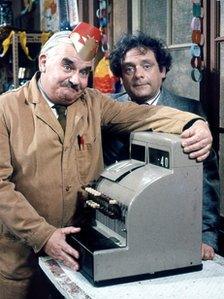Tax for small businesses: Your questions answered
- Published

Running a small business can be more complicated than you'd think
There are nearly five million self-employed people in the UK.
Tens of thousands try to join them by setting up in business every year.
For some it is simply an alternative to unemployment. For others it is, they hope, the beginning of a much bigger business.
Whatever the hopes and ambitions, the tax rules for the self-employed are much more complex than for ordinary employees.
We asked you to submit your questions on the dos and don'ts of arranging your taxes when becoming self-employed.
Ronnie Ludwig of accountancy firm Saffery Champness answers a selection of them.
<paragraph>When starting from scratch, is it prudent to go straight to being a limited liability company - so you do not lose your house etc if everything goes "pear-shaped"? Douglas Renton, Edinburgh.</paragraph>

Tax expert Ronnie Ludwig says that checks should be made if you intend to work from home
<paragraph>I have recently set up as a sole trader, helping small businesses with their operations. I have heard that if I work for one company for too long they may be forced to employ me; information on the specifics would put my mind at ease. I have found there are more than a few knowledge gaps when it comes to information on sole trading, do you happen to know of any good sources of information for reference? I have not found HM Revenue & Customs (HMRC) that helpful. Luke, Guildford, Surrey.</paragraph>
<paragraph>What is the time limit, or the limit for business expenses I can use when researching for my new business start-up? John Gotts, Knaresborough, North Yorks.</paragraph>
<paragraph>I would like to open a "by appointment only" bridal gown shop in my home. Would I have to pay business rates? Do I have to notify the council? Are there any taxes I would have to pay? The information available on my local council website is very limited. Emily Watson, Guildford, Surrey.</paragraph>
<paragraph>I am a sole trader and I have acquired a large job that will need the assistance of another self-employed person with a specific skill to undertake the work. Do I pay them from expenses or from cost of sales? James Powles, Tiptree, Essex.</paragraph>
<paragraph>Is it better to set up a limited company, use it as a parent company, and then set up another company that simply works for the parent company to save tax? Robert Antwi, Pershore, Worcestershire.</paragraph>
<italic>The opinions expressed are those of the author and are not held by the BBC unless specifically stated. The material is for general information only and does not constitute investment, tax, legal or other form of advice. You should not rely on this information to make (or refrain from making) any decisions. Links to external sites are for information only and do not constitute endorsement. Always obtain independent, professional advice for your own particular situation.</italic>